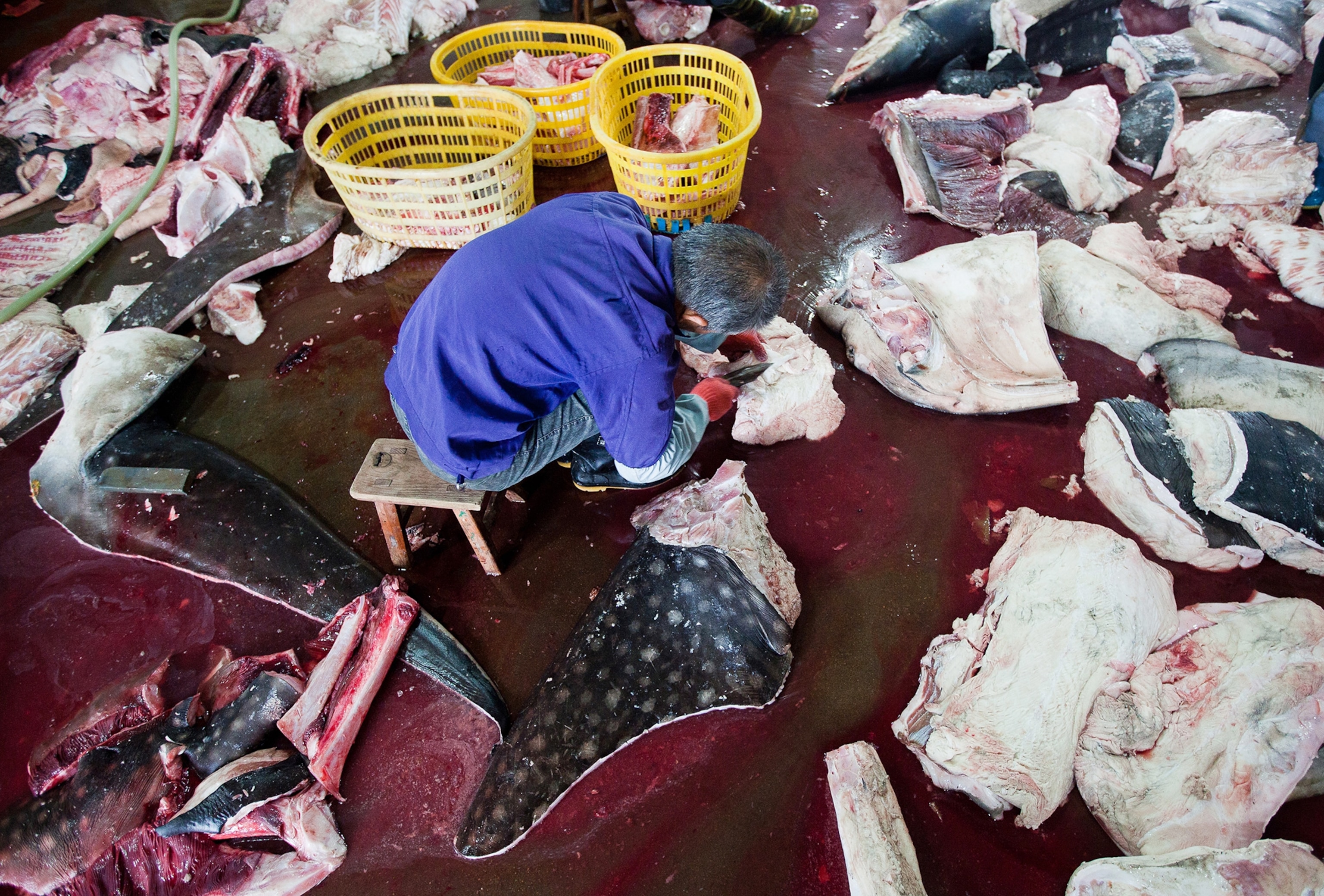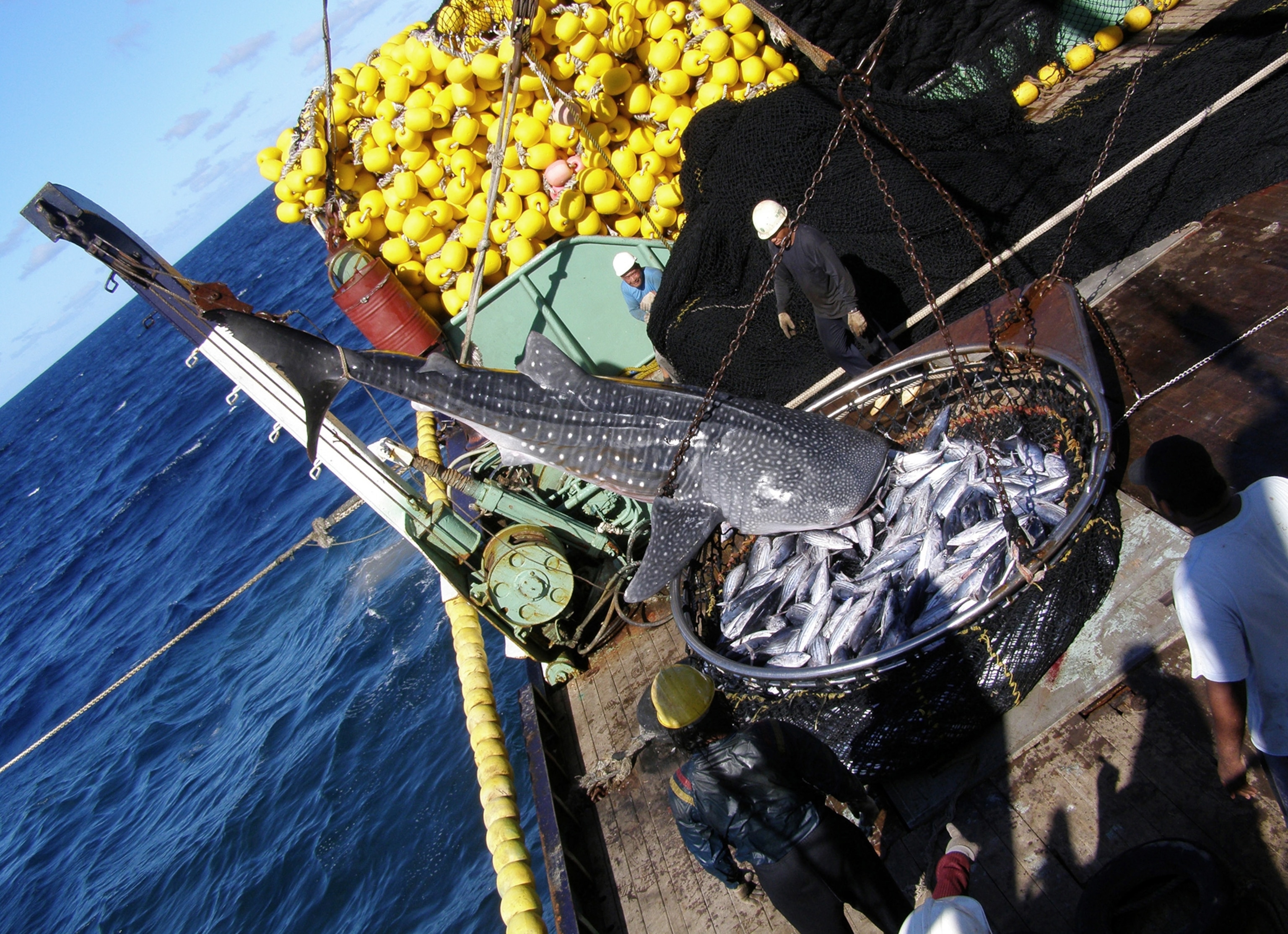
Slaughterhouse Said to Process "Horrifying" Number of Whale Sharks Annually
A recently released report by a nongovernmental organization found that about 600 whale sharks and basking sharks are processed by a factory in China every year.
Whale sharks are being slaughtered: That's the shocking news from a report issued by WildLifeRisk, a nongovernmental organization. A three-year investigation provides evidence that a factory in southeastern China is cutting up about 600 of the 21-ton (19-tonne) fish a year.
It's illegal—whale sharks are a protected species under Chinese and international law. But it's easy to understand why: A single carcass is worth about $30,000. The shark meat is sold for food, the fins are sold to restaurants for shark fin soup, the skin is sold to manufacturers for bags, and the oil is sold to companies that make fish oil supplements.
The factory is also reportedly killing and processing other species under international protection, including basking sharks and great white sharks.
Hong Kong-based activists Alex Hofford and Paul Hilton, who founded WildLifeRisk, visited the facility in PuQi township (map), China, three times between 2010 and 2013, posing as buyers. They obtained covert audio and video recordings of the factory's activities.
In a taped conversation between factory general manager Li Guang and a translator, Li states the facility processes between 500 and 600 big sharks each year, including whale and basking sharks.
A nongovernmental organization in China tipped off Hofford and Hilton to this factory. "But to protect them, we can't reveal their name," writes Hofford in an email to National Geographic.
Not a Little Thing
"If they're in fact processing 600 a year, that's pretty horrifying," says Robert Hueter, director of the Center for Shark Research at the Mote Marine Laboratory in Sarasota, Florida. The worldwide population is estimated to be in the thousands. (Read about whale sharks in National Geographic magazine.)
The report states that local fishers supply these sharks to the factory, but that the animals also come in from as far away as Indonesia, the Philippines, and Mexico.
Hueter can recall only one other similar instance of whale sharks being slaughtered: a legal fishery in Taiwan that took about 800 whale sharks between 1995 and 2008. That fishery folded six years ago due to international pressure.

Uncertain Protections
All three species—whale, basking, and great white sharks—are protected under CITES Appendix II, meaning that although they are not currently threatened with extinction, "they may become so unless trade is closely controlled," according to the CITES website.
Countries that have signed the treaty—which include China—must demonstrate that the export of species listed on Appendix II is done sustainably and legally, explains Sonja Fordham, president of Shark Advocates International in Washington, D.C.
The report states that China has its own national protections in place for these three shark species, and that a special permit is needed to hunt them.

A statement by the Bureau of Fisheries—which is under China's Ministry of Agriculture—in the South China Morning Post noted that "the hunting and sale of the three shark species was illegal on the mainland and punishable by a fine or jail sentence."
Forging Ahead
Hofford says that he and Hilton are now working with the director of The Cove—the documentary detailing the roundup of dolphins in Taiji, Japan—to bring wider attention and awareness to the issue of shark fisheries. (See also "Albino Dolphin: Uncertain Fate Awaits Rare Calf Captured in Japanese Hunt.")
Hueter himself is reaching out to colleagues in Asia to get more details on this factory.
"What bothers me about this report is that this is an undercover operation going on in China," Hueter says. "So if there's one of these [factories], the chances that there's more than one are pretty good, I'm guessing." (Learn about citizen scientists tracking whale sharks.)

Follow Jane J. Lee on Twitter.